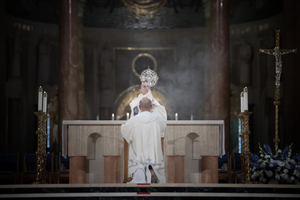Vatican Tight-Lipped About Papal Review of New Liturgical Translations
Congregation for Divine Worship is preferring not to comment on reported papal commission while liturgical experts dismiss concerns over its precise nature as exaggerated due to lack of information.

The Congregation for Divine Worship is declining to answer questions on reports that Pope Francis has created a commission to review new translations of liturgical texts from Latin into English and other languages.
In early January, Vaticanist Sandro Magister reported that the Holy Father had ordered a review of Liturgiam authenticam, the 2001 Vatican instruction that translations of liturgical texts closely follow the original Latin and other languages.
After much study and tireless efforts by episcopal conferences around the world over seven years, the Holy See approved a new English translation in April 2010. Most countries had put the new translation into effect by the end of November 2011.
The new commission, established by the Pope just before Christmas, will reportedly examine issues of enculturation and whether future translations could in some way be decentralized, although no details have been officially confirmed.
Cardinal Robert Sarah, prefect of the Congregation for Divine Worship and the Discipline of the Sacraments, and Archbishop Arthur Roche, Secretary of the Congregation, declined to answer questions about the review. The Holy See Press Office also did not respond to enquiries about the commission, neither confirming nor denying its existence.
Informed sources say the Congregation was not told of the review before it was leaked in January and, as of the end of February, it did not know who the commission members would be, nor did it have any details about the review. For the Congregation, therefore, the issue is understood to be very delicate.
Magister wrote Jan. 11 that the objective of the review is not “the correction of the degenerations of the post-conciliar liturgical reform — meaning that ‘reform of the reform’ which is Cardinal Sarah’s dream — but the exact opposite: the demolition of one of the walls of resistance against the excesses of the post-conciliar liturgists.”
According to Gerard O’Connell of America Magazine, Francis has two main reasons for setting up the commission: firstly, to foster decentralization in the liturgy by giving greater responsibility and authority to bishops’ conferences. The commission will allegedly address the issue of how much the Bishop of Rome is responsible for creating unity in the Latin Church through the liturgy.
Secondly, some bishops’ conferences believe the new translations to be “too rigid”, and reject such a concept as “sacral language.” According to America Magazine, they believe the 2001 instruction seeks “an almost literal translation” of the Latin liturgical texts into the vernacular or local language of the different countries, leading often to unsatisfactory results.
Archbishop Roche, reportedly head of the new commission, served ten years as chairman of the main coordinating body for the new English translation, the International Commission for English Language in the Liturgy (ICEL). In a speech in 2014, he affirmed the superiority of the new translation over the older one, saying the approach that governed the previous translations, until the new ones introduced by Liturgiam authenticam, had become “outmoded”.
Some liturgists, however, are playing down the media reports of the review, saying that sixteen years after Liturgiam authenticam and five years after the implementation of the new English translation of the Roman Missal, an appraisal of the reception of such an important text by the Holy See is reasonable and responsible. As such, they say nothing is extraordinary about this move.
Also, although the Congregation may not have been adequately informed about the current commission, it has spent the past months consulting many experts on the issue who have been intimately involved in the process of making vernacular translations of liturgical texts. Those involved are said to include some bishops who are members either of ICEL or Vox Clara (a separate committee of senior English-speaking bishops), and the consultative process has been discreet to enable those who participate to speak frankly.
For some, therefore, concerns about this review are at the moment overblown probably due to lack of information, and their attitude is rather one of wait and see.
- Keywords:
- divine worship
- english translation
- liturgy
















